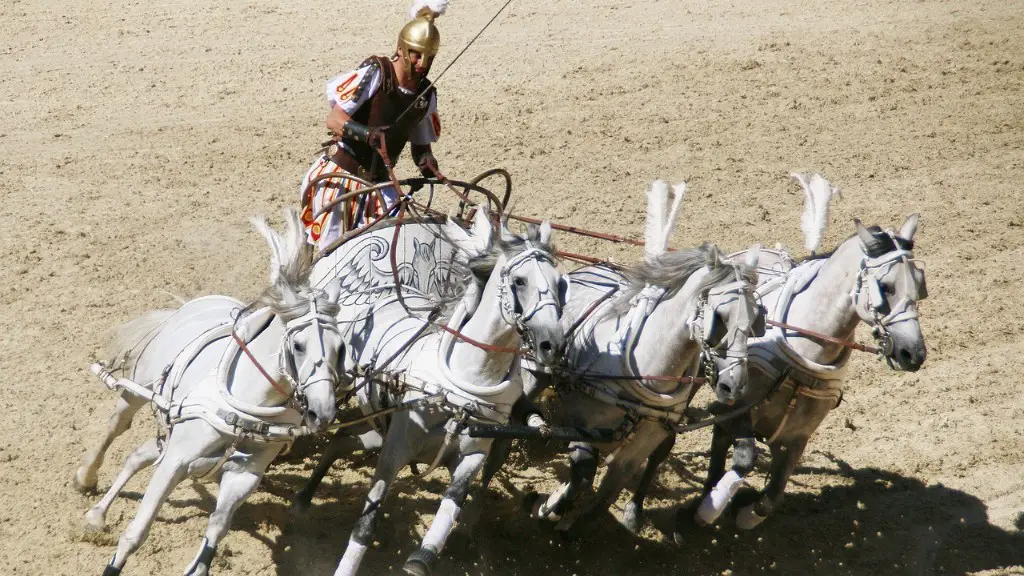Murder, Theft and Tax Evasion
In Ancient Rome, some crimes against people or property were punishable under the legal system or by execution. Often, these acts were considered to be a violation of the person’s honor or a crime against the state. Commonly illegal activities in Ancient Rome included murder, theft and tax evasion. Roman citizens were subject to the Roman legal system, and the punishment for these crimes could be harsh.
Murder was considered the most serious offence, and if a person was convicted of killing another person, the punishment could be death or exile. Roman courts would examine the circumstances of a murder before deciding a punishment. Theft was also a serious crime in Ancient Rome, and the punishment could range from exile to the death penalty. Tax evasion was also interpreted as a serious crime and often punished with death or exile. Evading taxes was seen as a betrayal of the public good and disrespect of the laws of the Roman Republic.
The policing of illegal activity in Rome was overseen by the Senate and the magistrates, who had the power to impose fines and other punishments for those convicted of crimes. The punishments for illegal activities ultimately established the rule of law in Rome and turned it into a powerful and influential city-state.
In the first two centuries of the Roman republic, criminals were legally free, and it was only until the third century BC that laws were enacted to prevent and punish crime. Roman law was seen as a major achievement of the Republic, not just dissuading people from committing crime but enforcing justice. The law also served as a strong deterrent, as anyone who disobeyed the law would be subject to harsh penalties.
The Roman legal system was based on the concept of natural law, which is derived from the source that natural laws are essential preconditions of justice. This was based on the notion that people should have certain rights and boundaries and have a code of behaviour that does not transgress the rights of others. It was believed that punishing those who broke the law was a way to maintain order and set an example for others.
The law in Ancient Rome was based on a combination of custom, tradition, and reason. This Was sometimes referred to as the mos maiorum or “the way of the ancestors”, as it was believed that the legal system should not depart from the values and practices of ancient Rome. The Law of the Twelve Tables, which was the basis of Roman law, was created in order to standardize and simplify the laws so that they would be accessible to all, including those outside the privileged classes.
Roman law also incorporated concepts of proportionality, which meant that judges had a certain amount of discretion in deciding the punishments for crimes. This allowed the judges to take into account the severity of the crime as well as other factors such as the background of the offender and their capacity to repay restitution.
Convenient and Abusive Divorce
Divorce in Ancient Rome was allowed and it was seen as a convenient way to end a marriage. Often, the dissolution of a marriage would be granted without much difficulty and could be done without the intervention of a court. In some cases, a divorce might be brought about under the pretext of certain legal defences, such as the husband’s inability to provide for the wife or the wife’s adultery. The husband was usually the one who initiated a divorce, and the wife was expected to comply with his wishes.
In some cases, the husband could take advantage of the wife and the law by using divorce as a way to force her to comply with his demands. As a result, Roman law eventually adopted a stricter approach to divorce, and certain grounds for divorce were prohibited. Under these laws, there were certain circumstances in which a divorce could not be granted, such as if there was an unpaid debt or if the husband could not prove that he had been wronged by the wife.
Divorce in Ancient Roman law was also complicated by certain religious requirements that a husband or wife would have to meet before a divorce was granted. For example, a husband and wife would need to offer sacrifices and make prayers to Jupiter before a divorce could be granted. This was done to ensure that the gods were not punishing the couple for their actions.
Additionally, Roman law required that the man and woman separately write and publish a notice specifying their intent to divorce. The notice had to be displayed in the Forum Romanum (Roman forum), with the man’s notice on the left side and the woman’s notice on the right side. This was done to make sure that the public was aware that the marriage had ended.
Although divorce was not unheard of in Ancient Rome, it was still seen as a morally deplorable act, and those who divorced could be subject to ridicule from others. There were social pressures that could influence certain aspects of a divorce, and those wishing to get out of a marriage had to be very careful when taking this step.
Slavery
Slavery was an integral part of Ancient Roman society, and the legal system reflected this in its rules and regulations regarding slaves. Although slavery was not illegal, it was still seen as a form of exploitation, and those in power had to follow certain laws in order to prevent slaves from being abused or mistreated. Slaves were considered property in Rome, and they were not allowed any basic human rights. They could be bought and sold, used for labor, and even executed if their owners so desired.
Slaves were also not allowed to own property or make any sort of legal contract. Slaves also had to perform any task that their master asked of them, regardless of how difficult or unpleasant it may be. In addition, if a slave committed any crime, their master was often held liable for the punishment.
The legal system in Rome also dictated the punishment of slaves who disobeyed the laws or acted against the wishes of their master. Slaves who were disobedient or ran away were subject to harsh punishments, such as amputation or death. In addition, a slave could be publicly humiliated or given a cruel and unusual punishment if their behaviour was considered reprehensible.
The position of slaves in Ancient Rome was different from other societies at the time. In other societies, slaves were seen as disposable, while in Rome they were viewed as more valuable and worthy of respect. Rome valued the importance of slaves in their society, and some slaves were even granted some basic rights. For example, Roman slaves were allowed to marry and have families.
Military Services and Conscription
Roman citizens were expected to serve in the military, and those who refused to do so without valid cause could be fined or removed from the military, depending on the circumstance. Any citizen of Roman descent was automatically eligible for conscription, and all men between the ages of 17 and 46 had to serve in the army. This was part of the mos maiorum, or “the way of the ancestors”, which emphasized the importance of civic duty and military service.
Recruits were subjected to a rigorous training regimen, which included the study of military tactics, physical conditioning and the use of weapons. Roman soldiers were generally well-equipped and had access to the latest military technology. The Roman army also employed specialists, such as engineers and scouts, who could provide invaluable knowledge and experience in battle.
In addition to providing military service, Roman citizens were also expected to fulfill certain obligations to the state, such as paying taxes. Roman citizens often had to pay a variety of taxes, such as a direct tax, which was a payment made by citizens to the state and a goods and services tax, which is a consumption tax that was imposed on certain goods and services. There were also taxes imposed on agricultural goods and goods imported from foreign countries.
Failure to pay taxes was considered a serious crime, and those who did not comply could face fines and other punishments, ranging from confiscation of property to imprisonment. The enforcement of taxes was a major priority for the Roman government, and many cities had their own tax collectors who went door-to-door to ensure compliance.
Capital Punishment
Capital punishment was an accepted form of punishment in Ancient Rome, and those convicted of certain crimes could be sentenced to death. This could be carried out in a variety of ways, such as stoning, crucifixion, burning at the stake, or death by wild animals. The punishment was usually public and often meant to serve as an example of what not to do.
Capital punishment was often reserved for serious offences, such as treason or crimes involving violence or theft. A person may also be sentenced to death if they failed to pay their fines or if they resisted arrest. In some cases, a court could sentence a person to death if their behaviour was deemed to be dangerous or disruptive to the peace and order of the Roman republic.
The penalty for capital punishment was the same for both citizens and non-citizens, although citizens were given certain rights and privileges that non-citizens were not afforded. For example, citizens were granted the right to appeal their sentence and could even be pardoned if the case was considered particularly unjust. However, non-citizens had no such rights and were subject to the same laws and punishments as citizens.
Capital punishment was seen as necessary in Ancient Rome in order to maintain order and punish transgressors. It was also seen as necessary in some cases to protect society from serious crimes, as well as to serve as a deterrent for others to not commit serious crimes.
Conclusion
Ancient Rome had a complex and intricate legal system that included laws to both prevent crime and punish those who committed it. In addition to punishing illegal activities such as murder, theft, and tax evasion, Roman law was also used to establish order and justice by regulating certain aspects of Roman life such as divorce, slavery, military service, and capital punishment. These laws were used to ensure peace and order in Ancient Rome, as well as to maintain certain morals and principles in Roman society.





